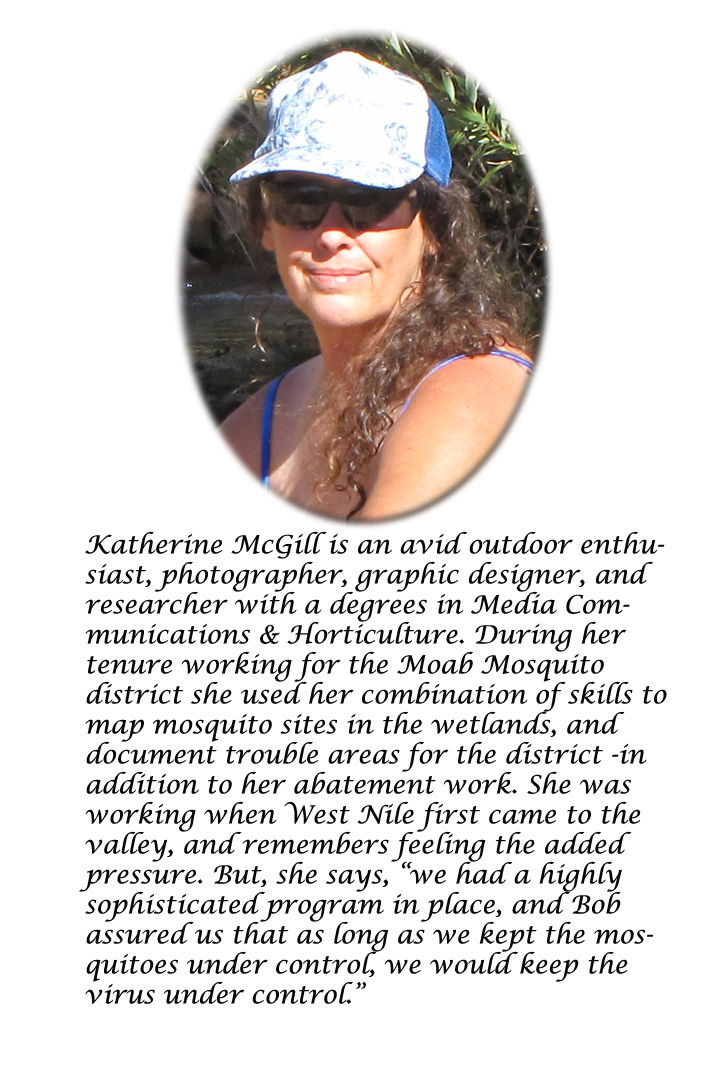Some information may be outdated.
I find it disturbing that our Moab Mosquito Abatement District seems to now believe that fogging everywhere is the solution for mosquito control.
In mid-September, the media reported that the district had discovered Aedes aegypti mosquitoes in our valley. Citing “growing concerns” over this invasive container-breeding mosquito, the district “ramped up” spraying with Biomist by enlisting the help of three other districts to fog nearly the entire town.
Let’s keep this in perspective.
In Arizona, of the 2,099 mosquito pools containing Aedes aegypti, none have tested positive for chikungunya, dengue, nor Zika virus according to the Arizona Department of Health Services website. There are three cases of travel-related chikungunya, eight cases of travel-related dengue, and no Zika or Yellow Fever cases.
According to the latest numbers available on the Centers for Disease Control website, of 408 cases of dengue fever nationwide, 405 were acquired by travelers going out of the country.
According to the CDC, “whereas mosquito-based surveillance is the preferred method for monitoring or predicting West Nile virus outbreaks, it is not the preferred method for monitoring or predicting DENV, CHIKV, YFV, or ZIKV (dengue virus, chikungunya virus, yellow fever virus, or Zika virus) outbreaks.” So what is going on here?
Everyone would agree that spraying was necessary this summer, due to the early failure of the district to adequately staff, plan ahead for the high water this year and get treatments out in the field to control the floodwater hatches. But the Aedes aegypti mosquitoes have different habitat preferences, biology, and behavior.
The Aedes aegypti prefer human-made habitat. They were imported into the U.S., and have spread due to global commerce. This mosquito can thrive indoors, breeding in swamp coolers and then infiltrating a house. These mosquitoes need very little water to breed in; even the lid from a soda container is enough.
The community needs to help. Obviously, abatement can’t explore every single yard. Remove or empty water collecting in tires, broken appliances, toilets, animal drinking troughs, sagging hot tub covers, tarps — anywhere water could accumulate. If you find larvae in a container, save some and report it to the district; this will help pinpoint problem areas.
Let’s do our part to get the mosquito abatement district back on track with an environmentally-sensitive program. Larvicide programs are the modern approach rather than fogging. By using larvicide products specific for mosquitoes, the district can kill the problem before it flies all over.
I worked for the district for nearly nine years, during many high water years. With few exceptions, we were able to control the mosquitoes. The previous district manager, Bob Phillips, was able to direct us where to go if trap counts rose. He did not sit around making excuses! He made sure he had enough workers and knew how to train us.
Having Aedes aegypti here is not the end of the world, nor the beginning of rampant disease —the CDC numbers and other health department data show this—so I say stop with the frequent fogging!
The next mosquito board meeting is Oct. 7 at the Sandflats office, 1000 E. Sand Flats Road. The meeting is to discuss a property tax increase to support a budget increase. While the increase is necessary, I urge the public to attend to find out how this money will be allocated.
Part of the manager’s job is to manage the staff and ensure there are enough field workers. We could have a mountain of larvicide and barrels of Biomist, but if there is no one to apply the product and without a manager that knows the territory well enough to direct workers, we will still have treatment failures or no treatment at all. I want to make sure the new budget is going toward enough field staff, and product, and not a raise for a manager that failed us.
Maybe the mosquito abatement district meetings should be held at the council offices to update the public on a plan of action and the status of mosquitoes and disease risk.
Bees do matter, fish matter, other beneficial insects matter–all of which can be harmed by exposure to Biomist. And it matters to me to not be rudely fogged on my evening walk or have Biomist sucked into my cooler because of repeated failures to notify residents of when spraying would occur.
Our health matters. Read any pesticide label and you will see the words “do not inhale.”
Katherine McGill is an outdoor enthusiast and researcher. She has fond memories of her tenure with the Moab Mosquito Abatement District.
Appreciate the coverage? Help keep local news alive.
Chip in to support the Moab Sun News.



